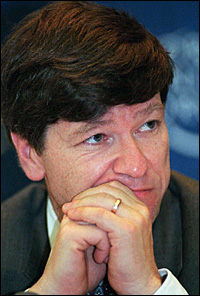Island in an Oil Boom
By David Hecht
Part 1, 2, 3, 4
 | Professor Jeffrey Sachs, director of the Harvard Insitute for International Development and co-author of the World Economic Forum's Global Competitiveness Report.
MANDEL NGAN/AFP/Getty Images |
Economists have long debated the connection between corruption and poverty. Are some countries poor because they're more corrupt? Or does corruption spring from desperate conditions of poverty?
This is where the second half of Sachs' big idea comes in. To stave off mass corruption that goes with big spending plans, Sachs is pushing for more openness and more accountability to outside donors.
He explains part of the idea to local U.N. representatives.
"We'll cooperate, and if you cooperate, we cooperate again next year, you cooperate again next year, we cooperate again the third year. And it's not that the Sao Tome side has to do everything perfectly, because this is hard, but that it has to do everything in good faith and it has to do everything up to its capability and money can't just go missing."
Sachs and other experts contend that governments and international companies will behave more responsibly if they publish all the details of their deals. Until recently, oil companies resisted this idea, preferring to work in the shadows, often in league with brutal dictatorships. But that seems to be changing. In February, Chevron Texaco agreed to make public all its payments, as part of its deal to explore waters between Sao Tome and its giant neighbor, Nigeria. David Goldwyn says the deal is part of a growing trend among oil companies.
"The industry as a whole has realized that this is a critical, reputational issue," says Goldwyn. "Their shareholders and investors care about these transparency issues and want them to operate in a way that makes public to the countries in which they operate how much the government is taking in."
Goldwyn says Sao Tome has become a test case for the so-called transparency movement.
"What's unique about Sao Tome," says Goldwyn, "is you're able to work with a country that isn't rich yet. So people are hoping to put in place measures to manage revenue, create transparency in governance, even build capacity in the government to manage the oil revenue which none of the other oil producing nations in the world have been able to do."
But Sao Tome is not working in isolation. Together with Nigeria, Sao Tome established a Joint Development Authority to control oil exploration in waters claimed by the two countries. The Development Authority is based in Nigeria, a country awash in corruption. Jeffrey Sachs and other experts suspect the authority's budget has been inflated and that someone is skimming off millions. Of course, the books are hidden. No transparency here. But Nigeria's ambassador to Sao Tome, Saidu Pindar, says the accusations are unfounded
"I don't think you have the information correctly," he says to our query.
"A lot of people have said that the budget seems inflated and that's the place where some of the money is going into people's pockets," we reply.
"Excuse me. Who are the people who are saying the budget is inflated? People who don't know what is happening start making allegations."
"Well, one of those people is Jeffrey Sachs."
"Who is Jeffrey Sachs? Is he a Sao Tomean?"
"No he's an economist."
"Is he a Nigerian?"
"No."
"I don't know any Jeffrey Sachs that works for Nigeria and works Sao Tome that has the right to get such a document."
Go to Part 4
| 


